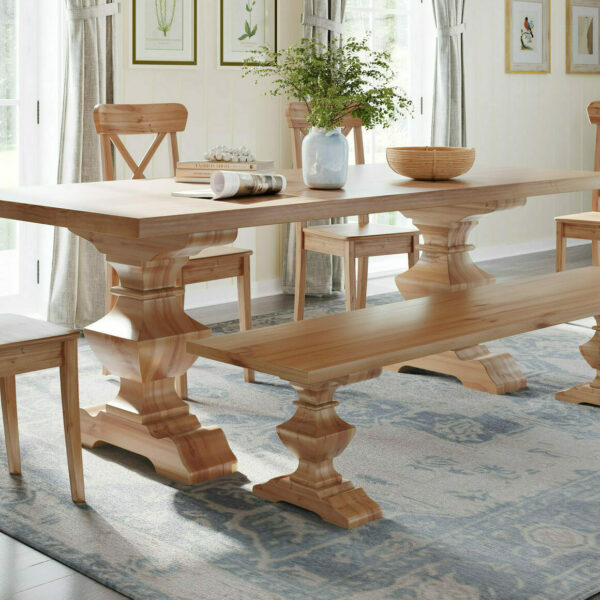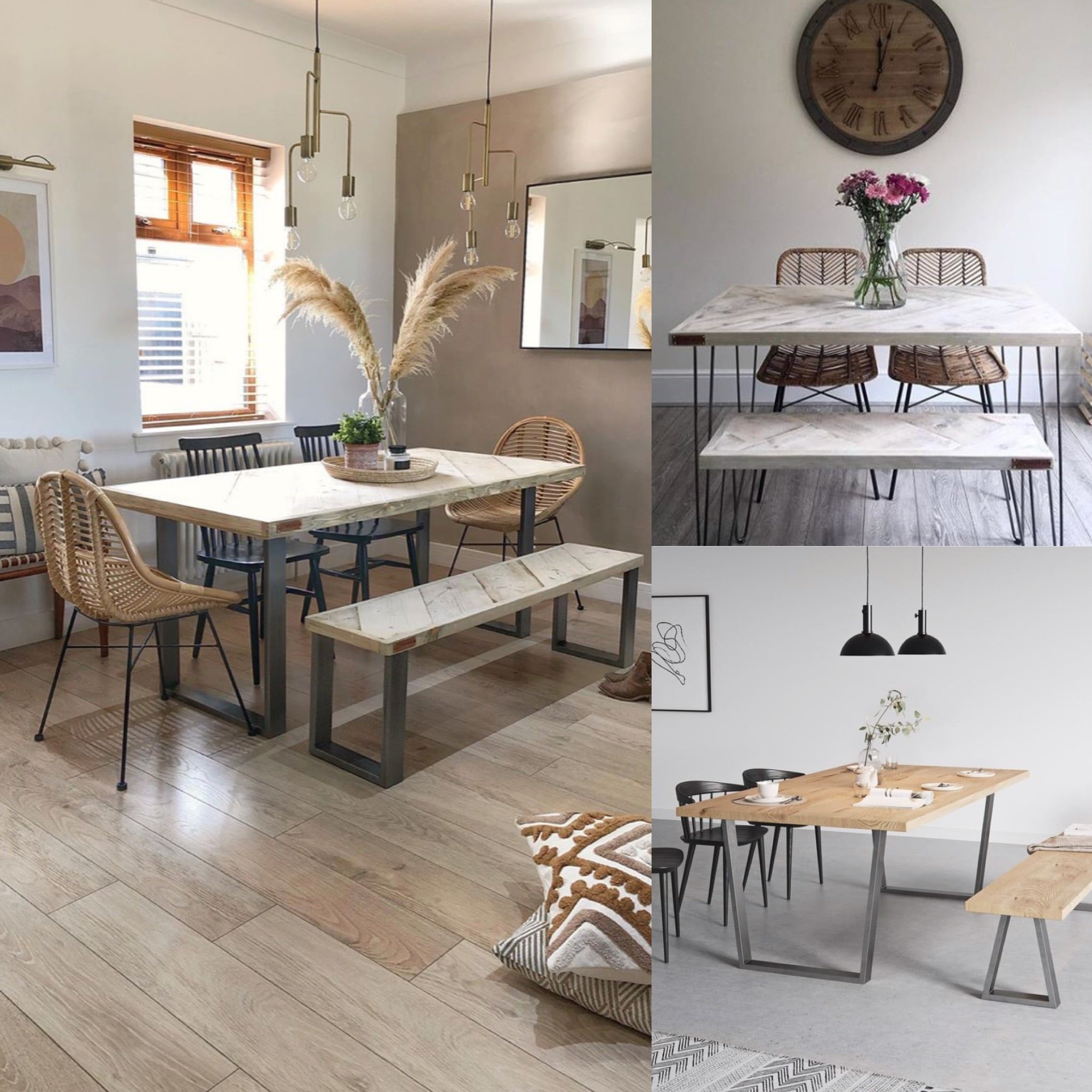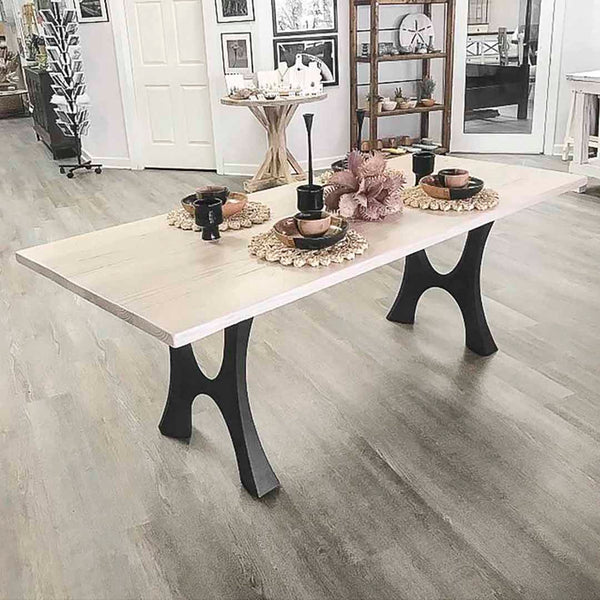Exactly How to Select the Perfect Dining-room Table Legs for Your Home Decor
Picking the excellent dining-room table legs is a nuanced process that requires cautious consideration of different components, including your space restrictions, visual choices, and useful needs. The interaction in between designs, dimensions, and products can substantially affect the setting of your dining area, making it necessary to approach this choice methodically. As you ponder the myriad alternatives readily available, it ends up being clear that the right option expands past plain look; it can enhance your general dining experience. What factors should you focus on to guarantee your selection enhances your home's distinct character?
Assess Your Dining Room
Evaluating your eating room is vital for choosing the right table legs that enhance both looks and functionality. Begin by measuring the measurements of your eating area, including ceiling elevation, flooring room, and closeness to various other furniture. This info will certainly help identify the suitable dimension and height of your table, which directly affects the selection of table legs.
Next, take into consideration the style and layout of your eating space. For circumstances, an open-concept layout may take advantage of table legs that offer visual agility, such as slender metal or acrylic alternatives. On the other hand, an extra conventional setup could ask for strong wooden legs that offer a sense of permanence.
Review the existing shade combination and materials in your dining area. Integrating the table legs with these aspects creates a cohesive appearance that improves the total decor.
Eventually, a complete analysis of your dining space will lead you in making an informed choice, guaranteeing that your table legs not just enhance the aesthetic appeal yet likewise serve functional purposes.
Consider Your Design Preferences
When choosing dining-room table legs, it is necessary to assess your individual design choices, as they substantially influence the total aesthetic of your dining room. Your choice of table legs can either enhance or comparison with existing design, making it crucial to align them with your recommended interior decoration theme.
If your home leans in the direction of a modern-day visual, consider sleek steel or minimalist wooden legs that offer a clean, minimalist appearance. For an extra typical technique, elaborate wood legs with complex makings can add a touch of beauty and sophistication. Industrial styles benefit from durable, raw materials such as recovered timber and metal mixes, reflecting a tough charm.
Furthermore, farmhouse and rustic designs often favor durable, chunky legs that stimulate a sense of heat and comfort. On the other hand, if your décor is diverse, you may choose unique forms or a mix of materials to create aesthetic passion.

Evaluate Product Options
The choice of product for dining area table legs plays a critical duty in both durability and aesthetic appeal. Common materials consist of timber, metal, and composite choices, each offering unique characteristics that can affect the total appearance and longevity of your table.
Timber is a classic option, known for its warmth and adaptability. Woods like oak and walnut provide phenomenal stamina and can be ended up in numerous discolorations to match any kind of decoration. Softwoods like ache are much more vulnerable to damages and scrapes, making them much less excellent for high-traffic locations.
Steel legs, typically crafted from steel or aluminum, radiate modernity and industrial appeal. They are extremely resilient and resistant to wear, making them ideal for families with kids or regular celebrations (dining room table legs). Furthermore, steel can Full Article be completed in various shades, boosting the modification possibilities
Composite products, such as MDF or laminate, offer affordability and diverse styles. While normally less durable than strong timber or metal, they can still offer a stylish appearance and are frequently very easy to preserve.
Eventually, the material you pick should straighten with your way of life, visual preferences, and the degree of use your table will experience.
Determine Height and Dimension
Picking the ideal height and dimension for your dining-room table is necessary for both functionality and convenience. The common height for eating tables typically ranges from 28 to 30 inches, enabling enough legroom for most individuals when seated. Nevertheless, it is crucial to consider the dimensions of your dining area and the kinds of chairs you intend to use.

Furthermore, think about the proportions of your dining room. A larger table in a large location can produce a grand ambiance, while a smaller table works well in more intimate settings. Ultimately, the right height and dimension will balance with your general decoration and improve the eating experience for you and your visitors.
Explore Customization Opportunities

Furthermore, the layout of the legs can be tailored to fit different styles, such as rustic, contemporary, or commercial. Tapered legs can evoke a mid-century modern-day feeling, while chunky, block-style legs might reverberate with standard or farmhouse decoration.
Property owners can also discover color surfaces, from all-natural timber spots to repaint, enabling them to match or comparison with the tabletop and bordering design.
Moreover, leg informative post elevation can be adapted to accommodate particular seating plans or personal preferences, improving both comfort and capability.
Last but not least, special embellishments, such as makings or decorative brackets, can further individualize the table legs, making the eating experience not just a dish yet a statement item in the home. By taking into consideration these personalization options, house owners can produce a dining-room table that genuinely reflects their uniqueness.
Conclusion
Picking the excellent dining-room table legs requires careful factor to consider of different aspects, including the measurements of the eating room, design preferences, material resilience, and desired elevation. Personalization alternatives further enhance the capability to achieve a natural visual that matches the total decor. By methodically assessing these elements, property owners can make sure that the chosen table legs not only meet practical needs but likewise contribute positively to the eating experience and atmosphere of the home.
Choosing the suitable dining space table legs is a nuanced process that needs mindful factor to consider of numerous elements, including your area constraints, aesthetic preferences, and useful requirements.Assessing your eating room is essential for picking the right table legs that match both appearances and performance.When establishing size, gauge the area where the table will be placed to ensure it fits easily, enabling for at least 36 inches of clearance around the table for very easy activity. A larger table in a roomy area can develop a grand setting, while a smaller sized table functions well in even more intimate setups.Picking the perfect dining room table legs needs cautious consideration of numerous factors, consisting of the measurements of the dining space, style choices, product additional reading longevity, and desired height.